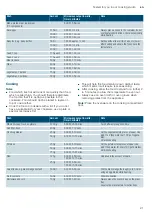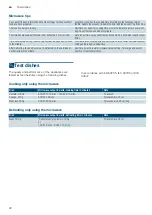
Tested for you in our cooking studio
en
19
J
Tested for you in our
cooking studio
Tested fo
r you in
our cooki
ng studio
Here, you can find a selection of dishes and the ideal
settings for them. We show you which microwave
output is best for your dish. There are also tips about
cookware and preparation methods.
Notes
■
The values in the table always apply to the cooking
compartment when it is cold and empty. Before
using the appliance, remove all unnecessary
cookware from the cooking compartment.
■
The times specified in the tables are only guidelines.
They will depend on the quality and composition of
the food.
■
Always use an oven cloth or oven gloves when
taking hot cookware out of the cooking
compartment.
:
Warning – Risk of scalding!
When pulling out the cookware, hot liquid may overflow.
Carefully pull the cookware out of the cooking
compartment.
The following tables provide you with numerous options
and settings for the microwave.
The times given in the tables are guidelines; they
depend on the cookware used, and the quality,
temperature and consistency of the food.
Time ranges are often specified in the tables. Set the
shortest time first and then extend the time if necessary.
It may be that you have different quantities from those
specified in the tables. There is a rule of thumb for
operating the microwave: Double the amount = double
the time, half the amount = half the time.
You can place the cookware in the middle on the
cooking compartment floor. The food will then absorb
the microwaves from all sides.
Defrosting
Place the frozen food in an open container on the
cooking compartment floor.
Turn or stir the food once or twice during the defrosting
time. Large pieces of food should be turned several
times. When turning, remove any liquid that has been
produced during defrosting.
Leave defrosted items to stand at room temperature for
a further 15 to 90 minutes so that the temperature can
even out. You can remove the giblets from poultry at
this point.
Note:
Place the ovenware on the cooking compartment
floor.
Dish
Weight
Microwave output in watts,
time in minutes
Note
Whole pieces of beef, pork or veal (on the
bone or boned)
800 g
180 W, 15 mins + 90 W, 15-25 mins Turn several times
1000 g
180 W, 20 mins + 90 W, 20-30 mins
1500 g
180 W, 25 mins + 90 W, 25-30 mins
Meat in pieces or slices of beef, veal or pork
200 g
180 W, 5-8 mins + 90 W, 5-10 mins
Separate the slices/pieces of meat when turn-
ing
500 g
180 W, 8-11 mins + 90 W, 10-15
mins
800 g
180 W, 10 mins + 90 W, 10-15 mins
Minced meat, mixed
200 g
90 W, 10-15 mins
Freeze food flat if possible;
turn several times during defrosting and
remove any minced meat that has already
defrosted
500 g
180 W, 5 mins + 90 W, 10-15 mins
1000 g
180 W, 15 mins + 90 W, 20-25 mins
Poultry or poultry portions
600 g
180 W, 8 mins + 90 W, 10-15 mins
Turn during defrosting;
remove liquid that escapes during defrosting
1200 g
180 W, 15 mins + 90 W, 20-25 mins
Fish fillet, fish steak or slices
400 g
180 W, 5 mins + 90 W, 10-15 mins
Separate any defrosted parts
Whole fish
300 g
180 W, 3 mins + 90 W, 10-15 mins
Turn during defrosting
600 g
180 W, 8 mins + 90 W, 15-20 mins
Vegetables, e.g. peas
300 g
180 W, 10-15 mins
Stir carefully during defrosting
Fruit, e.g. raspberries
300 g
180 W, 6-9 mins
Stir carefully during defrosting and separate
any defrosted parts
500 g
180 W, 8 mins + 90 W, 5-10 mins
Butter, defrosting
125 g
180 W, 1 min. + 90 W, 1-2 mins
Remove all packaging
250 g
180 W, 1 min. + 90 W, 2-4 mins
Loaf of bread
500 g
180 W, 8 mins + 90 W, 5-10 mins
Turn during defrosting
1000 g
180 W, 12 mins + 90 W, 10-20 mins
Cakes, dry, e.g. sponge cake
500 g
90 W, 10-15 mins
Separate the pieces of cake;
only for cakes without icing, cream or crème
pâtissière
750 g
180 W, 5 mins + 90 W, 10-15 mins






































